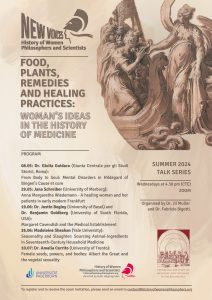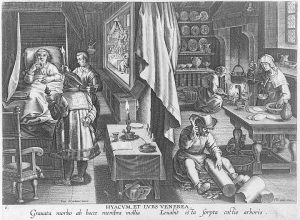19.06: Margaret Cavendish and the Medical Establishment and 26.06: Seasonality and Slaughter: Sourcing Animal-Ingredients in Seventeenth-Century Household Medicine
 On Wednesday, 19.06, at 4.30 pm, we will welcome Dr. Justin Begley (University of Basel) and Dr. Benjamin Goldberg (University of South Florida, USA) on Magaret Cavendish and the Medical Establishment.
On Wednesday, 19.06, at 4.30 pm, we will welcome Dr. Justin Begley (University of Basel) and Dr. Benjamin Goldberg (University of South Florida, USA) on Magaret Cavendish and the Medical Establishment.
Their talk explores how the seventeenth-century philosopher Margaret Cavendish interacted with the medical world of her time. We examine a set of historiographical issues arising from a manuscript collection of her and William’s medical recipes, MS Pw V90, preserved in the archives of the University of Nottingham. Our transcription and analysis of this manuscript (The Medical World of Margaret Cavendish, Palgrave-MacMillan: 2023) challenges the common view that Cavendish opposed traditional Galenic medicine as well as the Scholastic tradition. In grappling with her views on professional medicine, we also investigate whether Cavendish faced any discrimination or mistreatment from her doctors because of her gender, as some have suggested, focusing on her relationship to one of her physicians in particular, the prominent doctor Théodore de Mayerne. Along the way, we highlight the medical achievements (mainly in the recipe field) of other noblewomen in Cavendish’s network.
On Wednesday, 26.06, at 4.30 pm, we will welcome Madeleine Sheahan (Yale University) on Seventeenth-Century Household Medicine:
Seventeenth-Century Household Medicine:
Springtime was an industrious season of the 17th century household. In a period of domestic production and proactivity, household medical practitioners worked to prevent illness and preserve health. The perceived environmental subjectivity of the body encouraged practitioners to prepare stocks of medicine for a host of ailments believed to arise from changing climatic, ecological, and astrological conditions, as well as shifts in human activity, labour, and diet. At the same time as the changing environment threated the health of the body, springtime opened new possibilities to sources natural ingredients for the making of remedies. Of note was the provisioning of pregnant and juvenile animals, made readily available by the changing season and desired for their perceived medical efficacy. Turning to these seasonal aspects of domestic medical care, this talk provides an analysis of animal sourcing and processing techniques recommended in a series of seventeenth-century English manuscripts recipes authored by women. In highlighting the interconnected issues of seasonality, medical provisioning, and animal utility, it illuminates a domestic epistemology of animal use and value, as well as the local, environmental specificity of household medicine in the seventeenth century.
Everyone is welcome to attend.
To register and to receive the zoom invitation, please send an email to contact@historyofwomenphilosophers.org
You cannot copy content of this page








